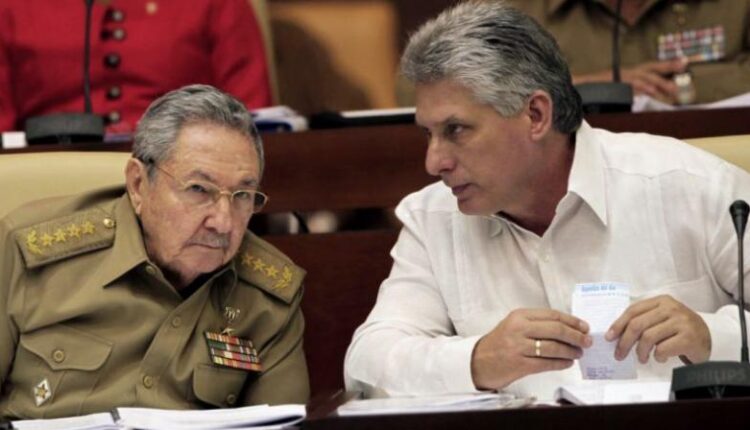
The Raúl Castro era
From La Jornada
Three years ago Raúl Castro announced that his successor as first secretary of the Communist Party of Cuba (PCC) will be the current president of the republic, Miguel Díaz-Canel, who will thus occupy both positions at the same time.
The changeover is scheduled to take place in the eighth Congress of the PCC (April 16-19). Castro will leave his last public office and will conclude the 62-year cycle in which the leaders of the 1959 revolution held the top leadership. Post-Castroism will begin, a new generation will be at the forefront, the legitimacy of origin will cease, and the legitimacy of management will have to be built.
In the National Assembly of People’s Power (ANPP, Cuba’s parliament) of April 19, 2018, Castro drew up a kind of de facto rule which disjointed the jobs of Head of State and leader of Cuba’s Communist Party (PCC) and the holder(s) of each position will follow one another with lapses in which one of them will retain both positions.
In this way if Díaz-Canel fulfills the two terms that he can serve as head of state, then in 2028 he will continue for three more years as party leader and will be replaced in that position by whoever is, in turn, his successor as president. It is, said Castro, to “assure a viable transition and save us the substitute’s learning period.” All nicely tied.
The mechanism was adapted to what the 2019 Constitution would later order: a maximum of two terms as Head of State and a maximum age of 60 for a first-term office holder.
“Either we rectify, or the time for skirting the precipice will expire; we will sink, and we will sink […] the efforts of entire generations.”
The successor became established in the first echelon of the State and the sole political party, but not in the rest of the PCC’s political bureau, the powerful executive body where the average age of its members is 69 and eight of its 17 members are older than 75. The congress will see how fast the replacement of generations is maintained, which until now has been slow and decided by death and other medical causes.
Under the current rules the retention of power will not be repeated for decades, as was the case with Fidel Castro. Raúl set limits to the lead positions where the time of succession was reduced. He also pushed for a transfer of power to a younger generation, but soon showed his disappointment with the results. At the sixth congress, on April 19, 2011, he said that the persistence of veterans in the front row of the party was due to “deficiencies […] that have prevented us from today having a reserve of mature substitutes with sufficient experience.”
At the fifth congress, in 1997, the PCC began an incipient relay. Almost a third of the political bureau was under the age of 50, but just over a decade later almost all were disgraced. Díaz-Canel was the “only survivor,” Raúl told the aforementioned 2018 assembly.
At the triumph of the 1959 revolution, Fidel announced that he would promote Raúl as his substitute, but it took 47 years for that to happen.
When illness finally removed Fidel from public life in 2006, Raúl became head of state, of the government, and the PCC for an interim of a year and a half. He then served two full terms as president and two as party leader, all of which resulted in a leadership period of 15 years. Allotted much less time than his predecessor, he promoted the recognition of individual freedoms, resumed relations with the United States, and pushed for economic reform.
The expansion of freedoms is subject to testing the facts, and depends on the prevalence of the Constitution over secondary regulations and the actual performance of the security organizations. The understanding with Washington was frustrated in the short term by the relentless offensive launched by [Donald] Trump, which showed the vulnerability of agreements that don’t have legislative backing. With Biden, options for detente are open, but much remains to be seen.
Unlike his older brother, who saw the opening of the economy as a lesser evil forced by circumstance and that could be reversed at the first opportunity, Raúl considered it the only door to salvation for the Cuban political system. Before the ANPP, he synthesized the alternative on December 18, 2010: “Either we rectify, or the time for skirting the precipice will expire; we will sink, and we will sink […] the efforts of entire generations.”
Although it was known that time was limited, Raúl undertook the reform under the slogan, “without haste but without pause.” In 2017, he recognized that internal discrepancies were slowing down the changes, which would continue at the speed allowed by “consensus.” The following year the central committee of the PCC explained the slowness due to the “complexity” of the plan, errors and resistance from the bureaucracy.
Just this year reform measures were accelerated when the Cuban economy is at its worst moment in decades with its internal lag and under the simultaneous blows of U.S. aggression, the Venezuelan crisis and the pandemic. It is the package left to the next generation.
Gerardo Arreola is a former correspondent for Mexico’s La Jornada in Cuba (2001-2013).

